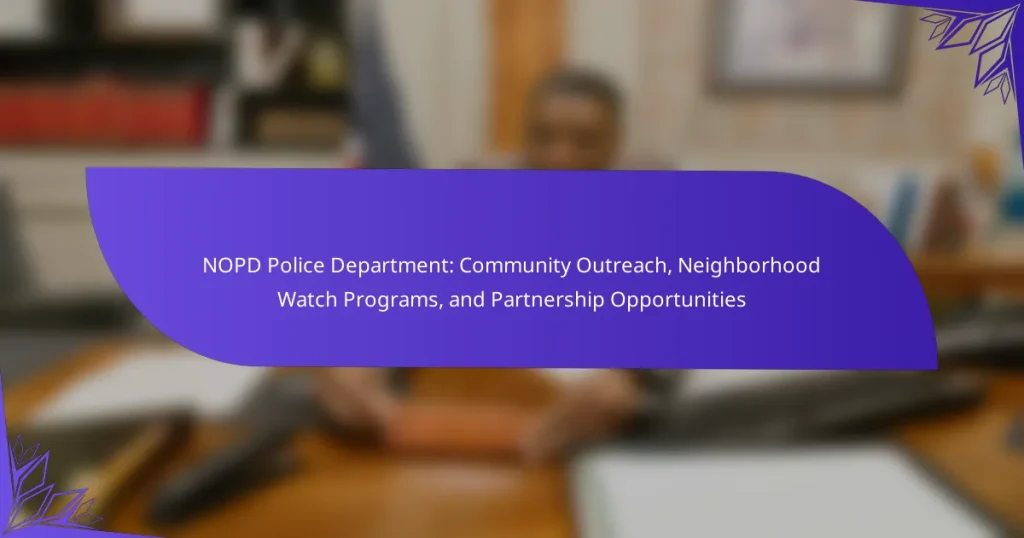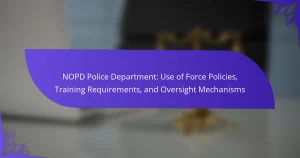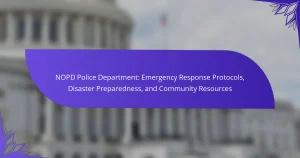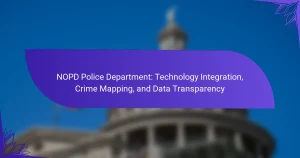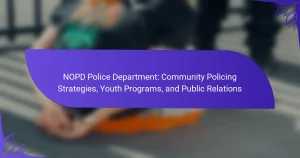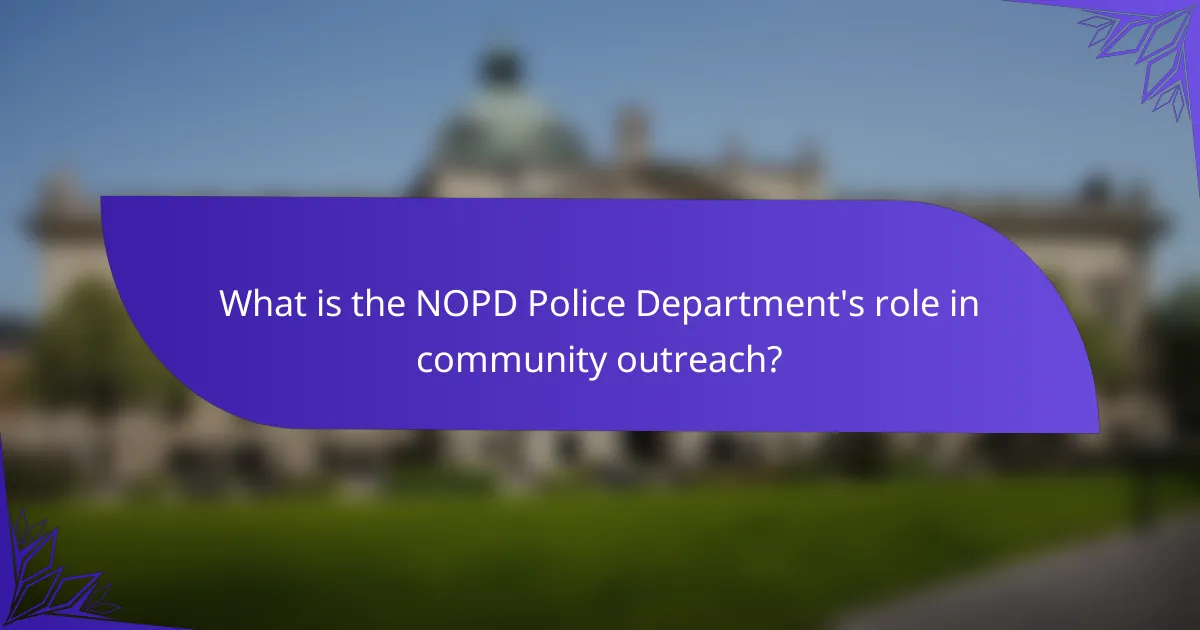
What is the NOPD Police Department’s role in community outreach?
The NOPD Police Department’s role in community outreach involves building relationships with residents. This outreach aims to enhance public safety and trust. The department conducts programs that promote community engagement. Events like neighborhood meetings allow for direct communication. NOPD also collaborates with local organizations to address community concerns. These initiatives help to foster a sense of community ownership. Statistics show that community engagement reduces crime rates. Overall, the NOPD’s outreach is essential for effective policing and community partnership.
How does the NOPD engage with the community?
The NOPD engages with the community through various outreach initiatives. These initiatives include community meetings and events to foster open communication. NOPD officers participate in neighborhood watch programs to enhance local safety. They collaborate with community organizations to address specific concerns. The department also utilizes social media to share information and gather feedback. Engaging with schools and youth programs is another critical aspect of their outreach. These efforts aim to build trust and improve relationships with residents. According to NOPD reports, community engagement has led to increased cooperation in crime prevention efforts.
What programs are included in NOPD’s community outreach initiatives?
NOPD’s community outreach initiatives include programs like the Neighborhood Watch, Youth Programs, and Crime Prevention Workshops. The Neighborhood Watch program encourages community members to collaborate with law enforcement. Youth Programs focus on engaging young people through educational activities and mentorship. Crime Prevention Workshops provide residents with strategies to enhance safety in their neighborhoods. These initiatives aim to strengthen community ties and improve public safety.
How does community feedback influence NOPD’s strategies?
Community feedback significantly influences NOPD’s strategies by shaping their policing approach and operational priorities. The department actively solicits input from residents through community meetings and surveys. This feedback helps identify public safety concerns and areas needing improvement. NOPD uses this information to adjust patrol strategies and resource allocation. For example, increased crime reports in specific neighborhoods prompt targeted policing initiatives. Additionally, community feedback fosters trust and collaboration between officers and residents. This partnership enhances public safety and encourages community involvement in crime prevention efforts. Overall, community input is vital for NOPD to remain responsive and effective in its policing strategies.
Why is community outreach important for the NOPD?
Community outreach is important for the NOPD because it fosters trust and collaboration between the police and the community. This relationship enhances public safety and encourages crime reporting. Engaging with residents allows the NOPD to understand community concerns better. It also helps in building positive relationships with diverse populations. Outreach programs can lead to more effective policing strategies tailored to specific neighborhoods. Statistics show that communities with active outreach initiatives experience lower crime rates. The NOPD’s commitment to outreach demonstrates its dedication to transparency and accountability. Overall, community outreach is essential for effective law enforcement and community well-being.
What impact does community outreach have on public safety?
Community outreach significantly enhances public safety. It fosters trust between law enforcement and communities. This trust leads to increased cooperation in reporting crimes. A study by the Bureau of Justice Statistics found that communities with active outreach programs report a 20% decrease in crime rates. Additionally, outreach initiatives educate residents on safety practices. They also encourage community involvement in crime prevention strategies. Overall, community outreach creates a safer environment through collaboration and communication.
How does community outreach foster trust between the police and residents?
Community outreach fosters trust between the police and residents by promoting open communication. It allows residents to express their concerns and share information. This two-way dialogue builds mutual understanding. Engaging in community events helps police humanize their role. Residents see officers in non-enforcement situations, which builds rapport. Programs like neighborhood watch encourage collaboration and shared responsibility. Trust is reinforced when police respond to community feedback. Research shows that communities with active outreach programs report lower crime rates and increased satisfaction with police services.
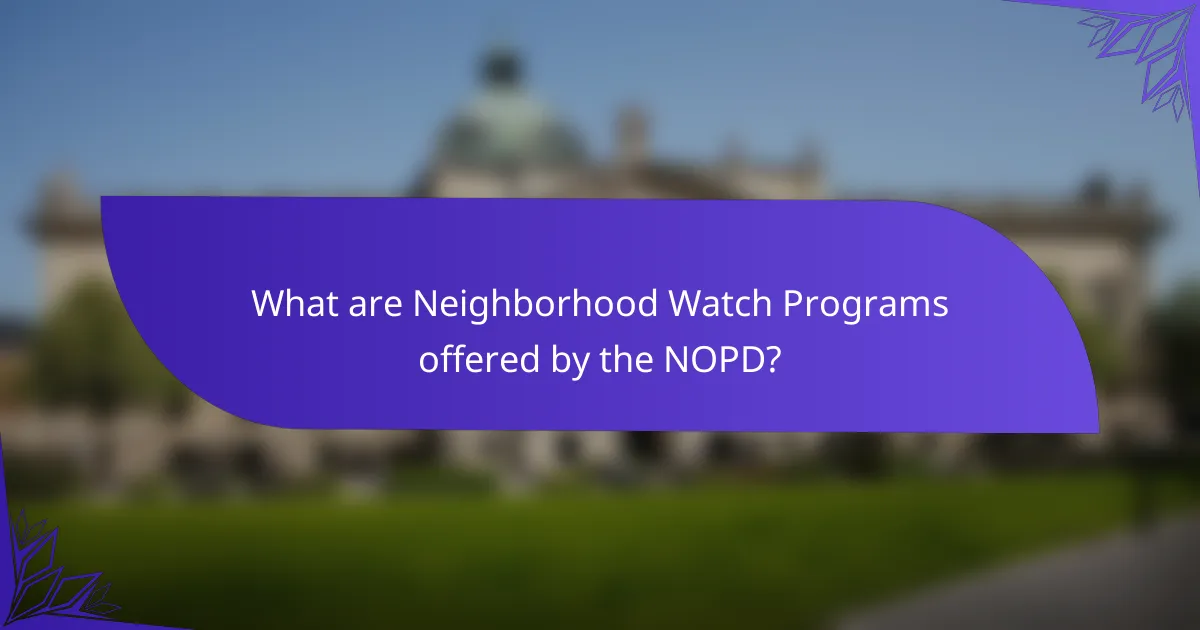
What are Neighborhood Watch Programs offered by the NOPD?
Neighborhood Watch Programs offered by the NOPD are community-driven initiatives aimed at enhancing neighborhood safety. These programs encourage residents to collaborate with law enforcement to identify and report suspicious activities. Participants receive training on crime prevention strategies and effective communication with police. The NOPD provides resources and support for organizing meetings and events. This initiative fosters a sense of community and empowers residents to take an active role in their safety. Studies show that neighborhoods with active watch programs experience lower crime rates.
How do Neighborhood Watch Programs operate?
Neighborhood Watch Programs operate by fostering community involvement in crime prevention. Residents organize to monitor and report suspicious activities in their neighborhoods. They hold regular meetings to discuss safety concerns and strategies. Participants receive training from local law enforcement on crime prevention techniques. Collaboration with police enhances communication and response to incidents. These programs aim to create a safer environment through vigilance and community solidarity. Studies show that active Neighborhood Watch Programs can reduce crime rates significantly, as they encourage proactive engagement among residents.
What are the key components of a successful Neighborhood Watch Program?
A successful Neighborhood Watch Program includes community involvement, communication, and crime prevention strategies. Community involvement fosters trust among residents. Regular meetings encourage participation and information sharing. Effective communication ensures residents are informed about local issues. This can include newsletters or social media updates. Crime prevention strategies include educating residents on safety practices. Programs often collaborate with local law enforcement for support. Statistics show that active Neighborhood Watch Programs can reduce crime rates significantly. For example, a study by the National Crime Prevention Council found a 26% decrease in crime in areas with active programs.
How does the NOPD support Neighborhood Watch groups?
The NOPD supports Neighborhood Watch groups by providing training and resources. They offer crime prevention workshops to educate participants. The NOPD also supplies materials for effective communication. These materials include crime statistics and safety tips. Officers are available to attend meetings and engage with community members. This direct interaction fosters trust and collaboration. Additionally, the NOPD encourages the formation of new groups. They assist in establishing connections with local law enforcement. This comprehensive support strengthens neighborhood safety initiatives.
What benefits do Neighborhood Watch Programs provide to communities?
Neighborhood Watch Programs provide numerous benefits to communities. They enhance community safety by fostering vigilance among residents. Increased communication between neighbors leads to quicker reporting of suspicious activities. This proactive approach can deter crime, as potential offenders are aware of heightened surveillance. Studies show that neighborhoods with active watch programs experience lower crime rates. For instance, a report by the National Crime Prevention Council indicates a 16% reduction in property crimes in areas with such initiatives. Additionally, these programs promote community cohesion and strengthen relationships among residents. They create a sense of belonging and shared responsibility for public safety. Overall, Neighborhood Watch Programs contribute to safer, more connected communities.
How do these programs enhance crime prevention efforts?
Community outreach programs, including Neighborhood Watch, enhance crime prevention efforts by fostering collaboration between residents and law enforcement. These programs encourage community members to report suspicious activities. Increased vigilance leads to quicker responses to potential crimes. A study by the National Institute of Justice found that neighborhoods with active watch programs experience a 16% reduction in crime rates. Additionally, these programs build trust and communication channels between police and citizens. This partnership enables more effective crime-solving and prevention strategies. Overall, such initiatives empower communities to take an active role in their safety.
What role do residents play in the success of Neighborhood Watch Programs?
Residents play a crucial role in the success of Neighborhood Watch Programs. Their active participation fosters a sense of community and vigilance. Engaged residents report suspicious activities to law enforcement. This communication strengthens the partnership between the community and police. Research indicates that neighborhoods with active watch groups experience lower crime rates. A study by the National Crime Prevention Council found that community involvement is key to program effectiveness. Residents also help organize meetings and events, enhancing awareness. Their commitment to neighborhood safety builds trust and cooperation among neighbors.
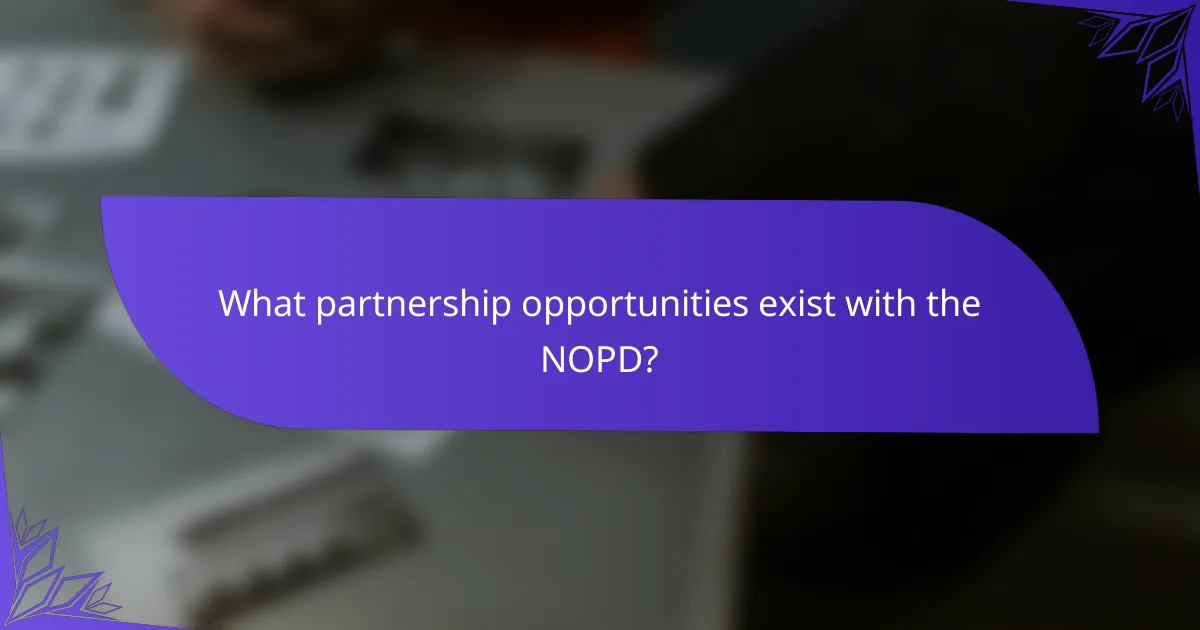
What partnership opportunities exist with the NOPD?
The New Orleans Police Department (NOPD) offers various partnership opportunities focused on community engagement. Organizations can collaborate with NOPD through neighborhood watch programs. These programs empower residents to actively participate in crime prevention efforts. Additionally, NOPD seeks partnerships with local businesses to enhance public safety initiatives. Community organizations can also partner to support youth programs aimed at crime reduction. NOPD encourages involvement in community policing efforts to build trust and cooperation. These partnerships aim to improve overall community safety and quality of life.
How can local organizations collaborate with the NOPD?
Local organizations can collaborate with the NOPD through community outreach initiatives. These initiatives can include organizing safety workshops and neighborhood meetings. Local organizations can also participate in the NOPD’s Neighborhood Watch Programs. This involvement fosters communication between residents and police. Additionally, organizations can help in crime prevention efforts by sharing resources and information. Collaborating on community events can strengthen relationships. Joint programs can address specific local issues, enhancing public safety. Such partnerships have been shown to improve trust and cooperation in communities.
What types of partnerships are most beneficial for community safety?
Collaborative partnerships between law enforcement, community organizations, and residents are most beneficial for community safety. These partnerships facilitate communication and trust. They enable the sharing of information regarding local crime trends. Neighborhood Watch programs exemplify effective collaboration. They empower residents to report suspicious activities. Community organizations can provide resources for crime prevention initiatives. Engaging local businesses can enhance safety measures through surveillance and lighting. Research shows that community policing strategies reduce crime rates significantly. A study by the National Institute of Justice found that community engagement decreases fear of crime.
How does the NOPD facilitate partnerships with schools and businesses?
The NOPD facilitates partnerships with schools and businesses through community engagement initiatives. They conduct outreach programs that promote collaboration between law enforcement and educational institutions. NOPD officers participate in school safety workshops and presentations. This builds trust and communication with students and staff. The department also collaborates with local businesses on crime prevention strategies. They offer resources and training to enhance security measures in commercial areas. Regular meetings with community stakeholders further strengthen these partnerships. These efforts aim to create a safer environment for all residents.
What are the advantages of partnering with the NOPD?
Partnering with the NOPD enhances community safety and engagement. Collaborating with the NOPD allows for improved communication between law enforcement and residents. This partnership fosters trust and transparency, leading to a more effective response to crime. Community members gain access to resources and training through NOPD programs. These initiatives include crime prevention workshops and neighborhood watch support. Statistics show that neighborhoods with active partnerships experience lower crime rates. Additionally, the NOPD provides a platform for community input on policing strategies. This collaboration ultimately strengthens community resilience and quality of life.
How can partnerships improve community policing efforts?
Partnerships can significantly enhance community policing efforts by fostering trust and collaboration between law enforcement and community members. Through partnerships, police can gain valuable insights into local issues and concerns. Engaging with community organizations allows for shared resources and joint initiatives. These collaborations can lead to more effective crime prevention strategies. Research shows that community involvement reduces crime rates and improves public safety perceptions. For instance, a study by the Urban Institute found that neighborhoods with active partnerships reported a 20% decrease in crime. Overall, partnerships empower communities and create a safer environment.
What resources does the NOPD provide to its partners?
The NOPD provides various resources to its partners, including training programs and community engagement initiatives. These resources aim to enhance collaboration between the police and community organizations. The NOPD offers crime prevention workshops that educate partners on safety measures. Additionally, they provide access to crime data and statistics to inform community strategies. The department also facilitates neighborhood watch meetings to foster communication. Furthermore, the NOPD engages in outreach events to strengthen relationships with local groups. These resources are designed to promote public safety and community trust.
What are best practices for engaging with the NOPD?
Establish clear communication with the NOPD to engage effectively. Attend community meetings to stay informed about local issues. Build relationships with officers by introducing yourself and discussing community concerns. Utilize social media platforms to share information and updates. Participate in neighborhood watch programs to foster collaboration. Report any suspicious activity promptly to the NOPD. Follow up on reported issues to ensure they are addressed. Respectfully provide feedback on police-community interactions to improve relations.
How can residents effectively communicate their concerns to the NOPD?
Residents can effectively communicate their concerns to the NOPD by utilizing multiple channels. They can contact the NOPD directly via the official website or phone number. Attending community meetings allows residents to voice concerns in person. Additionally, residents can use social media platforms to engage with the NOPD. Submitting written complaints or feedback through official channels is also an option. Utilizing neighborhood watch programs fosters direct communication with local officers. Engaging in community outreach initiatives helps build relationships with law enforcement. These methods ensure that residents’ voices are heard and addressed by the NOPD.
What steps can organizations take to initiate a partnership with the NOPD?
Organizations can initiate a partnership with the NOPD by first reaching out to the department’s community engagement division. This division is responsible for fostering relationships with community stakeholders. Organizations should prepare a clear proposal outlining their goals and how they align with NOPD’s mission. They can then schedule a meeting with department representatives to discuss potential collaboration. Providing examples of past successful partnerships can strengthen their case. Organizations should also be prepared to discuss the resources they can offer, such as volunteer support or community programs. Following up after the initial meeting is crucial to maintain communication and demonstrate commitment. Engaging in community events hosted by the NOPD can further solidify the partnership.
The NOPD Police Department plays a crucial role in community outreach, focusing on building relationships with residents to enhance public safety and trust. Key initiatives include Neighborhood Watch programs, community meetings, and collaboration with local organizations, all aimed at addressing community concerns and fostering engagement. The article outlines how community feedback influences NOPD strategies, the importance of outreach in crime prevention, and the benefits of partnerships with schools and businesses. Additionally, it highlights the resources provided by the NOPD to support these efforts, emphasizing the role of residents in successful crime prevention initiatives.
